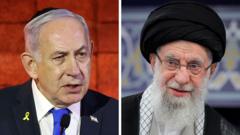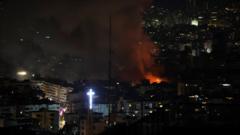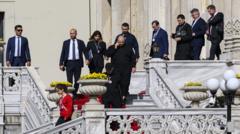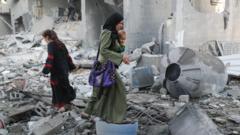The Kurdistan Workers' Party (PKK) has declared a ceasefire with Turkey following a call from its leader, Abdullah Ocalan, to dissolve the group and lay down arms, raising hopes for peace after decades of conflict.
Kurdish PKK Announces Ceasefire with Turkish Government
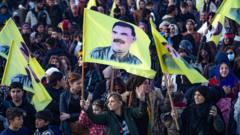
Kurdish PKK Announces Ceasefire with Turkish Government
The PKK calls for disarmament as jailed leader Abdullah Ocalan urges an end to the armed struggle.
Despite the ceasefire declaration from the PKK, tensions remain high in the region as Turkish President Erdogan warns of renewed military operations if the ceasefire conditions are not adhered to. Abdullah Ocalan, the PKK's jailed leader since 1999, has been pivotal in advocating for a peaceful resolution to the long-standing conflict, which has claimed tens of thousands of lives since the PKK initiated its insurgency in 1984. Transcending its original goal of Kurdish independence, the PKK is currently seeking enhanced autonomy and rights for the Kurdish population, which makes up about 20% of Turkey's population.
Ocalan's recent call for peace was publicly addressed to the Kurdish ecumenical and political community, with emphasized pleas for disarmament. The PKK's statement confirmed a ceasefire effective immediately, conditioned upon its forces not taking any armed actions unless provoked. Ocalan's prison conditions were also highlighted, with a request for him to be afforded more freedom and contact with others.
In the wake of the ceasefire announcement, reactions that took place across Kurdish regions saw thousands gathering to observe the statement on large screens, indicating hopefulness among Kurdish leaders. However, skepticism persisted, particularly among Turkish officials, who have previously expressed doubts about the PKK’s intentions.
Amidst these developments, Ocalan has acknowledged the facilitating role played by political leaders within Turkey—including Devlet Bahceli, the nationalist party leader—as a constructive influence for ongoing negotiations. The potential for a solution, however, remains uncertain as historical animosities and political challenges continue to loom over the possibility of lasting peace.
The PKK has become a highly polarizing element in Turkish politics, classified as a terrorist organization by multiple nations, including Turkey, the EU, and the US. As the call for a renewed approach to peace unfolds, the next steps will be critical in determining the future of Kurdish-Turkish relations, which have been marred by violence for decades.
Ocalan's recent call for peace was publicly addressed to the Kurdish ecumenical and political community, with emphasized pleas for disarmament. The PKK's statement confirmed a ceasefire effective immediately, conditioned upon its forces not taking any armed actions unless provoked. Ocalan's prison conditions were also highlighted, with a request for him to be afforded more freedom and contact with others.
In the wake of the ceasefire announcement, reactions that took place across Kurdish regions saw thousands gathering to observe the statement on large screens, indicating hopefulness among Kurdish leaders. However, skepticism persisted, particularly among Turkish officials, who have previously expressed doubts about the PKK’s intentions.
Amidst these developments, Ocalan has acknowledged the facilitating role played by political leaders within Turkey—including Devlet Bahceli, the nationalist party leader—as a constructive influence for ongoing negotiations. The potential for a solution, however, remains uncertain as historical animosities and political challenges continue to loom over the possibility of lasting peace.
The PKK has become a highly polarizing element in Turkish politics, classified as a terrorist organization by multiple nations, including Turkey, the EU, and the US. As the call for a renewed approach to peace unfolds, the next steps will be critical in determining the future of Kurdish-Turkish relations, which have been marred by violence for decades.



